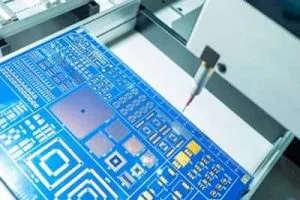JHY PCB Blog Hub
Your Source for Expert PCB Design, Manufacturing, and Assembly Insights – Stay Informed with 2025 Trends!
5 Best Wire Sintered Filters for Efficient Filtration Solutions
In the pursuit of efficient filtration solutions, Wire Sintered Filters have emerged as a critical component across various industries, including pharmaceuticals, food and beverage, and chemicals. According to a recent market analysis by Research and Markets, the global filtration market is projected to reach $65.4 billion by 2025, with a significant emphasis on advanced filtration technologies that enhance operational efficiency and product quality. Wire Sintered Filters are particularly valued for their ability to provide high strength, temperature resistance, and precise filtration capabilities, making them essential in applications requiring stringent purity standards.As industries strive for improved processes and sustainability, understanding the top choices in wire sintered filter technology can lead to enhanced productivity and reduced waste, positioning businesses to meet the evolving regulatory demands and customer expectations. In this blog, we will explore the five best wire sintered filters, showcasing their unique benefits and applications.
Top 5 Wire Sintered Filters: Data-Driven Choices for Optimal Filtration Efficiency
When it comes to achieving optimal filtration efficiency, choosing the right wire sintered filter is crucial. According to a recent industry report from Market Research Future, the global filtration market is projected to reach $65 billion by 2025, driven by stringent environmental regulations and increased demand for clean water. Wire sintered filters stand out due to their superior mechanical strength and high resistance to harsh chemical environments, making them ideal for a variety of applications, from petrochemical processing to pharmaceuticals.
To maximize filtration performance, consider filter materials that can withstand higher temperatures and pressures. For instance, filters made from 316L stainless steel can offer better corrosion resistance and longevity compared to carbon steel options. Additionally, ensure that the pore size of the filter aligns with the specific application requirements; studies indicate that a pore size of 5-20 microns can significantly enhance particle retention and improve the overall efficiency of the filtration process.
Tip: Regular maintenance and replacement of filters are essential for sustaining filtration efficiency. A recent survey by the Filtration Society highlighted that systems with timely filter changes see a 30% increase in operational performance. Don’t overlook the need for periodic cleaning, as accumulated debris can lead to reduced flow rates and increased energy consumption.
Filtration Efficiency Comparison of Wire Sintered Filters
Understanding Wire Sintered Filter Technology: Mechanisms and Benefits in Industry
Wire sintered filters have emerged as a pivotal solution in various industrial filtration applications, offering a unique blend of efficiency and reliability. Comprised of multiple layers of fine wires that are sintered together, these filters provide a high degree of filtration precision, making them ideal for removing particulates from liquids and gases. The sintering process ensures that the filter retains its structural integrity even under high-pressure conditions, thus enhancing its lifespan and reducing maintenance costs for industries that rely on continuous operation.
The mechanisms behind wire sintered filter technology involve a combination of depth and surface filtration. The multi-layered structure allows larger particulates to be trapped in the upper layers while smaller particles are captured deeper within the filter. This dual-action approach not only optimizes the filtration process but also maintains a low-pressure drop across the filter, ensuring efficient flow rates. Additionally, these filters are resistant to chemicals and high temperatures, making them suitable for a wide range of applications, including oil and gas, pharmaceuticals, and food processing, where stringent hygiene and safety standards are paramount.
Key Performance Metrics: Comparing Filtration Efficiency of Top Wire Sintered Filters
When it comes to selecting wire sintered filters, understanding their filtration efficiency is crucial for optimizing performance in various industrial applications. Key performance metrics, such as particle retention, flow rate, and pressure drop, play a significant role in determining how effective a filter will be in any given setup. Comparing these metrics across different models helps identify the best options available, ensuring that your filtration system meets the specific requirements needed for seamless operation.
Tips for improving filtration efficiency include regularly monitoring pressure drops across filters, which can indicate when the filter media is getting clogged or needs maintenance. Additionally, ensuring that you choose the right mesh size for your application can drastically enhance performance—larger mesh sizes are better for higher flow rates, while smaller sizes offer improved particle retention.
Another important consideration is the material composition of the filters. Stainless steel and bronze are popular choices due to their durability and resistance to corrosion, but the right material will depend on the specific chemicals and temperatures encountered in your processes. Always assess the operational environment to select a filter that will offer optimal efficiency and longevity.
Material Composition Matters: Analyzing the Impact of Filter Materials on Durability
When it comes to efficient filtration solutions, the material composition of filters plays a crucial role in determining their durability and effectiveness. The recent advancements in filter materials have underscored the importance of analyzing their impact on performance, especially in demanding applications such as wastewater treatment and structural health monitoring.
For instance, materials developed from natural fibers and composites present eco-friendly alternatives that enhance strength while reducing environmental footprints. Moreover, integrating innovative materials like graphene is reshaping the landscape of filtration technologies, offering superior performance in various environmental applications.
Furthermore, the exploration of non-destructive testing methods for evaluating the integrity of materials used in filtration systems highlights the ongoing efforts to optimize these technologies. As industries increasingly prioritize sustainability, selecting the right filtration materials becomes indispensable in extending the lifespan of filtration systems while ensuring efficient operation.
The combination of advanced filtration technologies and sustainable materials will likely lead to breakthroughs in how we approach environmental challenges, thereby reaffirming the significance of material selection in designing efficient filtration solutions.
Industry Applications: Where Wire Sintered Filters Excel Across Various Sectors
Wire sintered filters have gained prominence across various industries due to their exceptional filtration capabilities. In the oil and gas sector, for instance, these filters are integral in the separation of particulates and impurities from fuels and hydraulic fluids, enhancing system efficiency. According to a report by MarketsandMarkets, the global oil and gas filtration market is expected to reach $6.4 billion by 2025, driven significantly by the need for reliable filtration solutions like wire sintered filters that operate efficiently under extreme conditions.
In the food and beverage industry, wire sintered filters are employed to ensure product purity by eliminating contaminants during processing. Their ability to withstand high temperatures and pressures makes them ideal for applications like brewing and dairy processing. A recent study revealed that filtration plays a crucial role in maintaining product quality, with improper filtration linked to a 15% increase in product recalls. Utilizing wire sintered filters can mitigate these risks and enhance compliance with industry regulations.
Tip: When selecting a wire sintered filter, consider the specific application requirements such as temperature resistance, flow rate, and particulate size. This careful selection will not only optimize performance but also extend the lifespan of your filtration system. Another tip is to regularly monitor filter performance, as maintaining an understanding of pressure differentials can prevent unexpected downtime and costly repairs.










